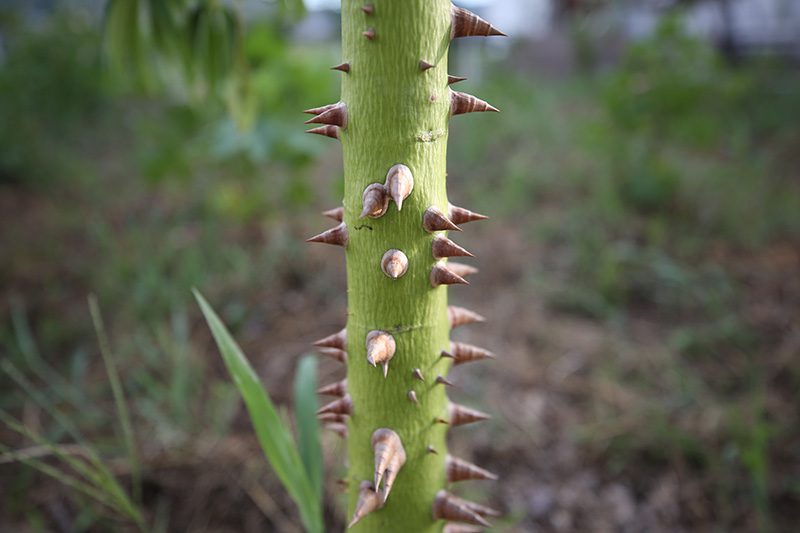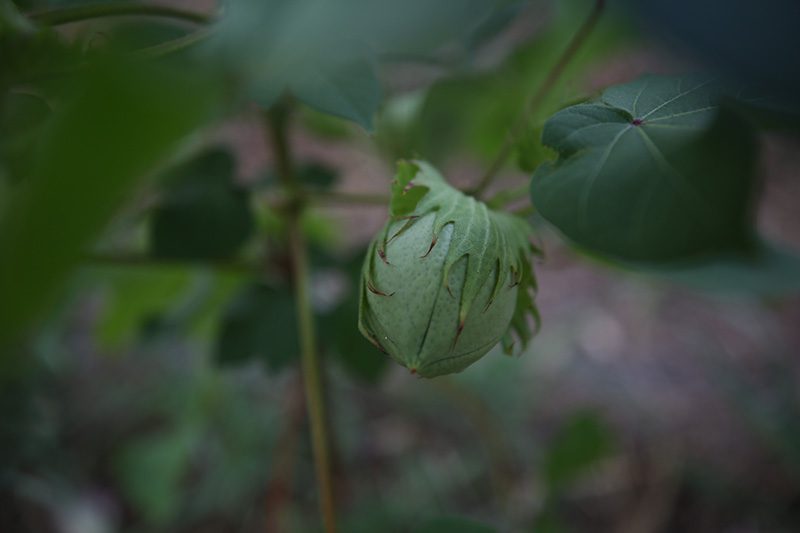niime 百科
Encyclopedia of niime
自給自足を目指して
食と農をめぐる新たな実験。
Aspiring to self-sufficiency - a new experiment in food and agriculture.
食と農をめぐる新たな実験。

2018 . 08 . 15
緑豊かな「日本のへそ」岡之山の麓、目の前に畑谷川が流れ、コットンを育てる畑がゆったり広がるtamaki niimeのshop&labは、周囲の自然も含めた心地良さに満ちている。そんな恵まれた環境の中で、この地球の生態系に想いを馳せながら、今ヴィーガンとして日々暮らしている玉木にとって、食と農業に対する関心が高まっていくのは必然ともいえるだろう。将来的には自給自足を目指してゆくことを公言する彼女の想いを聞いてみた。
― 農業に対する関心が深くなったきっかけはヴィーガンになったことでしょうか?
玉木「shop&labの後ろの土地を含めた此処の場所の活用をどうやってゆくかをずっと考えていて。浄化槽などもひとつずつ壊して更地に戻しつつあるので、じゃあそこをどうゆうスペースに今後していくかといえば、コミュニティじゃないけど、自給自足をさらに加速させるべく、出来る事を増やしたいなと思っていて。」
― それは面白そうな構想ですね。詳しく聞かせてください。
玉木「(酒井に向かって)もう言っていいの?」
酒井「何が?」
玉木「言わない方がいい?」
酒井「いい、いい。言ってしまった方がいい。言ったもん勝ちやもん。」
― またブッ飛んだアイデアが? (笑)さわりだけでもお願いします。
玉木「いま私たち…後ろは山でしょう?…すると山と川と土地があって、太陽があったら、人って生きていけるじゃないですか?でもそこでちゃんと自分たちで食べものを作って食べていけるというところまできちんと完結させたいという想いはずっとあるし、居て気持ちいいと感じる空間って今どんどん減っているじゃないですか?
日本でも世界中でも森を壊して何か建造物を建てるとか、人工物をどんどん造れば造るほど…だから、つくるんだけど、より自然になるような、自然に近い空間を人工的につくりたいと思ってるんです、この場所で。モノづくりもしてるし、もちろん人間が生活して生きているという場所だから“人工”なんですけど、でもちゃんと自然に寄り添ってるのか、自然らしく見えるのか、本当に自然なのかっていうものを追求したいと考えれば考えるほど、畑をつくること自体がもう“人工”だから、結局自然なものって植物だったり、そもそもの山の自然だったり、その感じをここに再現するためには、もっと植物のことを知らなきゃってなって、ちょっといま勉強してるんです。だから植物をいっぱい育ててその子たちを観察したりとか。冬越しできる子はどの子だろうとか。shop&lab移転記念に植樹したトックリちゃんが去年の台風で倒れてしまって枯れてしまったというのがすごいショックで。」
― 玄関横の背の高いあのトックリキワタの樹ですね?
玉木「復活してくれたらと立ててはいるんだけど冬越えがしんどかったみたいで。今年春になっても新芽が出てこないのでたぶんもう駄目なんじゃないかな…っていうのがあって。」
― そうなんですか…。
玉木「やっぱりそこの土地で生まれ育った植物の子たちはその土地にいるべくしているだろうから。こっちまで連れて来るってこと自体に無理があったんだな、という反省と。植物自体も種の保存という意味ではいろんな処に行って種を保存したいと願ってるからこそ、私たちがどこまで手伝う事が出来るかっていうのを…人間が運んでくれるっていうのも植物が望んでいるんですって。」
― へぇ〜…。
玉木「それは地面から切り離して運んでほしいと思ってるよりかはどちらかというと種として運んでほしいと思ってるそうなんですけど、クルミの実を鳥が食べてそれを遠くまで運んでくれたら種が残るだろうっていう想いとともに、そのための私たちは道具というか、種を保存するために私たちはいるという意味では何か出来る事があるかも…。私たちは植物に癒されているし、それがあるからこそ人間は生かされているし、植物と共存しているんだと思うけど、そこをもっと追求したいなと今思ってます。」
― 具体的には今京都まで農業を学びに行ってるんですね。
玉木「木であろうが草であろうが雑草であろうが、食べる野菜であろうが、それは同じことだと思うんです。全て植物じゃないですか?だから全部が繋がるんだろうなって思うから、まずは畑っていうところを教えてもらえる、土と植物との関係性、それに水が加わって、結局どのバランスが未来の地球にも優しく人間にも優しいのか?というのをもうちょっと理論でも教えてもらい、実体験として実際先生の前で農作業もやらせてもらって。ただ一人でやる農業って正しいのか正しくないのかもわからなくて、10年経っても結局分からないよねってなる可能性があるじゃないですか?今まで2、3年やってきていろんな先生の話をぐるぐる聞くけど、あの人の言ってる事とこの人の言ってる事は真逆の事言ってんだけど何でだろう?という場合が多々あって。その辺りをもっと自分で腑に落ちたいというか。」
― その疑問というのは理論的なところなのか、もっと具体的で実践的な農法というところですか?
玉木「両方含めて。例えば、耕すなという人もいれば耕せって人もいるとか。化学肥料使うなという人もいれば少しくらい使っていいんだと言う人もいて。美味しい野菜を作るために何が正しくて何が正しくないかってもうあって無いような世界じゃないですか、答えは。だからこそ人の言葉に惑わされるんじゃなくて、自分がこうしたいからこうするんだと私としては言えるようにしたい。だったら、もっとちゃんと知らなきゃいけないと思うから。科学的にもやって下さるし実地もやって下さるという講座だという事なので。実際に土壌診断もして、自分の畑が何が足りてなくて作物が出来ないのか?という様なところまで分析して、腑に落ちた上で、どうゆう肥料をどれくらい与えたら良いのかというところまで計算するという教え方で。それぞれの畑で土壌の条件が違うわけだから、ただ単にマニュアル見て一律に肥料これだけ入れたら大丈夫みたいにはいくわけがないと。そうゆうところを更にしっかり学びましょうというものなので。そこが分かるとウチの畑にしっかり活かされるし、それこそ木を育てる時でも植物を育てる時でも、育て方というものは全部リンクしていくだろうなと思ったから。」
― 植物が育つ根本的な原理というか、仕組みというか。
玉木「植物にとっての原理原則みたいなものをちょっとでもわかりたいなと思い、学びに行こうと決めました。」
― なるほど。酒井さんとしてはその辺りは…ノータッチ?
酒井「はい。」
― 絡みナシですか?
酒井「はい。」
玉木「絡みなかったら話にならないからちょっと絡んで!」
酒井「言うことないもん、だって。」
― そこに関しては玉木さんから酒井さんに問いかけとかしなかったんですか?
玉木「返ってこないもん。」
― そこは酒井さん的には関心を持ってない?
玉木「彼が関心持ってない事については自問自答で、自分で考える(笑)。私が今、月に1回すごく楽しみにしてるのは、四季があるからこそ、その時々で出て来るものが違うじゃないですか、だから片っぱしからお花屋さんとかそうゆうお店に行って、このシーズンの葉っぱのつき方の違うやつとか、こいつはなんなんだろうという見たことのない植物とかを見て回って買い漁るというのにハマってる。」
― 深入りすると、とことん追求出来そうな世界ですね。植物も野菜も幾らでも種類がありますし。種採りをしてその種をまた蒔いて育ててゆく固定種野菜の栽培も手がけてゆくつもりなんですね。
玉木「自給自足が私の夢だから。種が採れなかったら自給自足出来ないもん。その辺ハマりだしたらハマりそうだなと思いながら、まずはきちんと学ぼうというところから。」
― すでに取り組んでいるコットンの栽培についてはどうですか?
玉木「何種類か育ててますね。日本の綿である和綿と、もともと最初に種を蒔いたのがウチに向いてるよと言われたギリシャ綿で、それがスタートだったんですけど。」
― どういう点が向いてたんですか?
玉木「ギリシャの綿は白いんです。で、そこそこに良い綿で毛羽もそこそこある。最高級綿でもないから育てやすさもあって。とにかく“白い”っていうのが私の中では一番良かったかな。普通ちょっと黄色がかってるじゃないですか、どっちかっていうと白っぽい方が好きなので。漂白しなくても元々白いコットンっていうのは有難いなと思って。そこが気に入って使ってます。後は緑綿、茶綿というのもヴァリエーションとして。ただ年々収穫がしんどくなって来ていて。何も肥料入れずにとりあえず育てようとかってやってるから。畑として土が肥えてないから、コットン育てるの難しいやろな…ってゆうのは年々わかるんですよね。だんだんと採れる綿がちっちゃくなって。今のこのやり方が正しくないんだろうなというのはわかってるんですけど。今年の収量がどうなるのか、また新しく借りたところもあるのでわからないんですけど、元々その種に向かない場所での自然に任せた栽培は無理があるなというところで、やはり少しはこちらが出来る限りの事はしてあげた方が良いんじゃないかと思っているけど、“道”がよくわかってないのにあれが良いよこれが良いよと言われたことを順々にやっちゃうと、何やってるかわからなくなって、何のおかげで採れたのか失敗したのかすらわからなくなっちゃうから。これから農業を習いに行くところは油かすと米ぬかしか使わないってスタンスでされてて。それは初心者は動物性の肥料よりも植物性のものから始めた方が作りやすいからということで、素人向きなんだったら素直に信じて始めてみようかと。ただ動物性のがダメだと言ってるわけじゃないし、その講座では地産地消が良いからと地元の業者の方からゴマ油の油かすを分けてもらって使ってたりとか。こちらで黒田庄牛の堆肥を市が販売してるという話をしたらそれは地産地消だから上手く利用していくやり方もアリですね、という考え方なんですよ。なのでそこでは油かすと米ぬかでやってみて、どのくらいの量を入れたらよいかは自分の中で腑に落ちてから、牛フンだったらこれくらいの量なんだよというところもしっかり学んで来ようかなと。」
動物性の肥料とはいえ、牛が食料として草を食べそれが消化されて出来る牛フンは使用する事に何ら問題ないのではないか?何を食べているかが大事でそこをしっかり見極めれば…。ヴィーガンとしての立場も踏まえつつ食と農の本質を巡って玉木の探求は深まってゆく。
― こちらでも同時に野菜づくりをスタートさせるんですか?
玉木「あっちの土地とこっちの土地は違うからあっちでも作ってこっちでも作ってみて比べる実験をしてみたりとか。2週間に一度の講座なので、やり方を教わってこっちで種を蒔いてその苗を持って行ってむこうで植えたり。だからまずは1年間実験するってイメージかな?40種類くらいの野菜を作ってみて、いちおう1年後には、自分一人でできるようになるってカリキュラムなんですって!」
― それは勉強になりそうですね。
玉木「先生も同時進行で一緒に育ててるからこそ、お手本がある。ウチで一人でやってると上手く育ってるのか失敗してるかどうかわからないけど、生徒さんも20人くらいいるから、色んな失敗例が出るらしく、じゃあなぜなのか?というのはそこで検証出来る。」
― 1年は1回しかないので農作業の失敗は次の年のシーズンまで課題持ち越しになりがちでしょうけど、そうなると色んなケースが学べますね。
玉木「1年が凄く濃いんです。そういう意味では面白いなと思って。そうやって学んだ上で、これから畑を広げたいと思うのか、それこそ変わった野菜を育てたいと思うのか、やっぱり種採りをして地元特有の固定種野菜づくりでいきましょうと思うのか、それとももう野菜なんて作ってる場合じゃないよってなるのか。」
― 玉木さんの中で、いま野菜や植物がそれだけのウェートを占めているというのはなぜなんでしょうか?
玉木「やっぱり自給自足なんだと思う。結局、食べるもので人間って出来てるなというのをすごく思って。もちろん着るものも大事だし住むところも大事だけど…何て言ったらいいのかな…。」
― 今の世界に対する何か危機感みたいなものがあるんでしょうか?
玉木「地震だったり、今回の大雨による災害もそうだけど、本当に断絶された時に…。私、倉庫に力織機を置いて自分で織り始めた7〜8年前ごろ、戦争が起こると本当に思ってたんですよね。戦争が起こる気がすると思って。別に何の確信も無いし、可能性としてね、これからの日本がこの世界の中で絶対に戦争が無いなんて言い切れないし、それが多分戦争という形じゃなくても、今回の大雨だったり地震だったりという様に、絶対いまの資本主義の“当たり前”が、当たり前じゃなくなる日が近い将来来る、ってゆう危機感を、急に持ったんですよね。」
玉木が想い描く自給自足は、何かユートピアを追い求める理想主義というよりも、これまでの常識が崩れ不安定化する現在の世の中にいて、もっと切実な、ある種の危うさを予感する様な感覚に基づいたものである事が伺えてきた。
次回、玉木が考えるこれからの自給自足について、引き続き更に深く話を聞いてみたい。
書き人越川誠司
Surrounded by nature, the ‘tamaki niime’ Shop & Lab is filled with a comfortable air at the foot of the lush green Okanoyama located at the ‘Navel of Japan’. The Hatatani river flows in front of the Shop & Lab, and the vast cotton field it nurtures cotton spreads out before it. In such a free environment, Tamaki is thinking of the planet’s ecosystem. It is inevitable for Tamaki, who is living every day as Vegan, to increase concern for food and agriculture. She professes to pursue self –sufficiency in the future. I would like to ask her thoughts on the matter. – Did you come to be more interested in agriculture after you had become a vegan?
- Tamaki
- “I’ve been thinking about how to utilize this place, including the land behind the Shop & Lab. We are breaking down these old facilities including a septic tank and clearing the land. Well, we are wondering how we should use this space. We would like to do something that would accelerate our self-sufficiency within our own community. “
- Tamaki
- “Are we ready to explain?” (to Sakai)
- Sakai
- “What?”
- Tamaki
- “Should I not talk about it?”
- Sakai
- “It’s okay, you should say it. The person who speaks up wins!”
- Tamaki
- “We have mountains behind us. Also, we have a river, land and the sun. Since we have all that we need, don’t you think we can live with them? Actually, I have had a goal to make food by ourselves and eat them. Don’t you think we have less comfortable places because of deforestation and building something? More artificial things mean less comfortable space. So I would like to make a place artificially close to nature… here in this place. It is artificial because we create and even we live, however, the important thing is that we live naturally. Or I should say we are a part of nature? When we pursue natural creation, even cultivation is artificial. After all, real natural things are plants, mountains, so if we imitate nature here, I have to know more about plants. I grow many plants and observe them. For example, which one can survive through winter? The ‘Tokkuri-chan’, the memorial planting tree for our relocation anniversary, fell and withered because of the last year’s typhoon. That was really shocking. “
- Tamaki
- “I hoped that we might bring back to life, but the winter was too harsh for it. I don’t see any buds coming, so I’m afraid it is withered. “
- Tamaki
- “I believe the children of the plants are supposed to be at the place they originally sprouted. I regret moving it to here. After all, the plants that were born and grew up in the original land are supposed to be there. It was unreasonable to move it. I regret it. Because the plant itself wants to go to different places in the preservation of the species, so it hopes that human should carry it to a preferable location. “
- Tamaki
- “I heard that the plants prefer to have their seeds carried than to dig themselves out of the ground and carried to different places. I think walnut trees hope birds eat the walnut and carry their seeds far away so the species will last. We, humans, are part of the process. In other words, we exist for something we can do to keep the seed. We are healed by plants. Our existence is owing to plants, and we live with them. I’d like to pursue it now. “
- Tamaki
- “I think that trees, grasses, weeds, or vegetables to eat, are all the same. They are all plants, right? Because I believe we are all connected, I’d like to learn the field first. For example, the relationship between the soil and the plants, adding water. After all, what balance is the best for human and the future earth? That’s what I’m learning. And I actually practice as a real experience in front of the teacher. When I try agriculture, I’m not so sure if I’m doing right or wrong. Possibly even if I try ten years, I may be unsure whether I am doing right. The past few years, I’ve learnt from various teachers about different things; however, I sometimes feel that person and this person has a totally different theory. I would like to understand deeply by myself. “
- Tamaki
- “Both. For example, some people say cultivate, others say not to. Also, some people say they do not use chemical fertilizers, others say a little bit is a-okay. There is no perfect answer to make delicious vegetables. That’s why I would rather say not because someone said but also I want to do. So I should know better. The lecture was scientific, and it had a workshop. I was taught practically, for example, soil diagnostics, analyzing what is missing for my field for vegetables to grow or not grow. And once I fully understand the idea, I calculate how much fertilizer I should give. Each field has different soil condition, so we cannot just use a manual to add fertilizer in a single uniform way. The point is to learn deeper. Once I understand, I can utilize it for our field. When it comes to growing trees or plants, I think that “how to grow” will be all linked.”
- Tamaki
- “I decided to go to the seminar to have a better understanding of the principle for plants.”
- Sakai
- “Exactly.”
- Sakai
- “Definitely not.”
- Tamaki
- “If you don’t get involved, it’s not interesting!”
- Sakai
- “Actually, I have nothing to say.”
- Tamaki
- “I don’t get any response from him.”
- Tamaki
- “I answer my own question if Sakai is not interested in it. (laughs) Once a month, I’m really looking forward to checking and buying new plants at various flower shops. Because we have four seasons and in each season there are different kinds. I’m into new seasonal plants to see how they have leaves or simply wondering what they are.”
- Tamaki
- “Self-sufficiency is one of my dreams, but if we cannot collect seeds, we cannot pursue subsistence activities. I have a feeling that I will get into it, but first, I would like to learn agriculture properly.”
- Tamaki
- “We have been growing several kinds of cotton; ‘Japanese cotton’ and ‘Greek cotton’. Actually ‘Greek cotton’ was the first seed we planted which was initially said to be the kind suited for our land. That was our first time to start.”
- Tamaki
- “Greek cotton is white, and it is good quality and has enough fluffs. Since it is not the highest quality cotton, it is easy to grow. The best point of the “Greek Cotton” is the colour, ‘white’ for me. Usually, it is slightly yellowish, but I prefer a whitish one. It’s convenient because it is originally white without bleaching. I like that point. Green cotton and brown cotton are other variations. But harvesting has been getting more troublesome every year because we are trying to raise them without putting fertilizer tentatively. Gradually, I’ve learned that it is hard to raise cotton with weak fields. Cotton is getting smaller. I know that this is not the right way. I cannot assume the amount of crop this year. We rented new land; however, we may have difficulty growing a certain kind of plant species naturally, so I would like to do anything I can do for them. If I try everything I hear and try them one after another even though I don’t know the principal, I will not know what is good or bad for the bravest. The place I’m going this time has the stance that they only use oil cake and rice bran. For beginners, it is easier to create from the vegetable origin than animal fertilizer, so if you are suitable for amateurs, I should genuinely believe and begin. They don’t say animal fertilizer is bad. In that seminar, they use oil cake of sesame oil from a local company. Because “local production for local consumption” is right. When I mention that our city sells compost of ‘Kurodasho beef’, they said it is a good idea to use local produce. So I’ll use oil cake and rice bran there, and once I understand how much quantity to put in, then I will learn the amount of cow manure (needed).”
- Tamaki
- “Since the land in Kyoto and in Nishiwaki is different, I would like to have an experiment to compare. Since the seminar is held every two weeks, I can learn how. I sow seeds here and take them to Kyoto to plant. So I’ll try a-year-experiment first. That’s the image. I’ll grow about 40 kinds of vegetables, and after a year, I will be able to do it by myself. That’s the curriculum! “
- Tamaki
- “Because the instructor is raising it at the same time, I can see the example. If I grow here all by myself, I’m not sure if I’m doing okay or not, but as there are about 20 students, we see many mistakes. So we can validate the evidence about why it happened.”
- Tamaki
- “One year is significant. I think that it is interesting in that sense. So after learning this way, I wonder if I like to expand the field from now, to grow rare vegetables, to harvest a locally unique OP vegetable, or to end up not growing vegetables anymore.”
- Tamaki
- I think self-sufficiency is the key. After all, humans are made of food. Of course, what we wear and where we live are also important… what should I say… “
- Tamaki
- “When the lifeline is cut by earthquakes or the disaster caused by the heavy rain…like this time. About 7 or 8 years ago when I started to weave myself with a power loom in the warehouse, I really believed that a war would break out. I felt like we would have a war. I was not sure, but it was possible. I cannot predict that Japan will have absolutely no war in this world. Even if it is not a war, I had a sense of crisis, such as the heavy rain like this time or earthquakes. I suddenly have had a feeling of crisis that the days that we feel “normal” in capitalism will end sometime near future. “
Original Japanese text by Seiji Koshikawa.
English translation by Adam & Michiko Whipple.


